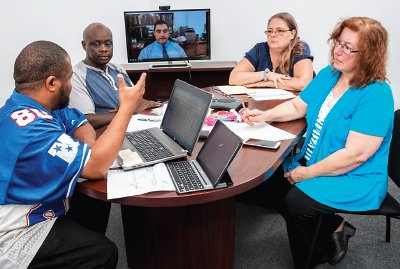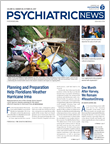Delaware is known as the “First State” since it was the first colony to ratify the United States Constitution, but that motto can also apply to another bold step undertaken in the state more recently. A few years back, Delaware became the first state to merge telepsychiatry with assertive community treatment (ACT).
Two teams managed by the nonprofit Resources for Human Development (RHD) have been using telepsychiatry since 2014. The teams are known as RHD Kent ACT2 and RHD New Castle ACT2 and are based in Dover and Wilmington, respectively.
For some, it may seem an odd pairing. A core aspect of ACT—a proven therapy for severe mental illness such as schizophrenia—is the idea of face-to-face contact. Multidisciplinary ACT teams meet with patients both in clinics and in their communities (at home, at work while on lunch break, or at another similar location in the community) to help patients recover and reintegrate into society.
Could this model still work if the ACT psychiatrist was present via an iPad or similar device?
“I had some concerns about telepsychiatry coming in, since I thought many clients wouldn’t want to talk to a television, but it has not been a problem at all,” said Shelley Sellinger, M.D., a New York–based psychiatrist and mental health consultant for the Kent ACT team. “A couple of patients had some wariness initially, but they warmed quickly. I even had one patient with television-related paranoia, but he was totally fine with the arrangement.”
Laura Marvel, director of RHD Kent ACT2, agreed. “It doesn’t matter if the psychiatrist is in person or on a screen,” she told Psychiatric News. “If we have access to a good doctor, it doesn’t matter where the doctor is.”
The incorporation of telepsychiatry was born out of necessity. In 2012, Delaware awarded ACT contracts to RHD to help provide better outpatient care to people with severe mental illness such as schizophrenia. RHD found out quickly that getting psychiatrists involved was difficult given the time commitments; in addition to traveling across the state to make scheduled or emergency house visits, ACT team members meet weekly to discuss patient progress.
Around that time, Dan Khebzou, an account executive with the telepsychiatry firm InSight, was meeting with RHD administrators in Philadelphia to discuss service options. He heard about the difficulties RHD was having in hiring psychiatrists for the newly formed ACT teams and suggested the telepsychiatry option.
“I’ve encountered resistance in using telepsychiatry for vulnerable populations from regulators; they cite issues such as licensing, technical problems, or handling civil commitments through video,” said Khebzou. “But Delaware was willing to embrace telepsychiatry, so it presented an opportunity to prove this model.”
After a successful pilot program, RHD moved full steam ahead with telepsychiatry in 2014, and the program is still going strong today, Marvel said. Besides patient acceptance, she said that other ACT team members—which include case coordinators, nurses, and social workers—are on board with the technology. They have not seen Sellinger’s participation via video during their weekly team meetings as hindering the team dynamic.
If anything, Sellinger said, the remote aspect can help build some relationships with the team. “I can conduct most assessments remotely as well as in person, but there are elements that are difficult, such as testing AIMS (Abnormal Involuntary Movement Scale) or rigidity,” she said. “In these cases, the on-site nurses are my eyes and ears, and we communicate about what’s going on. In addition, they will let me know about hygiene if it’s pertinent, so they also are my nose.”
There are occasional technical glitches as well, but Marvel said the teams have established back-up plans to reach Sellinger in case of some malfunction with the video monitor used in the clinic or the iPad used on the road. “I’ve found Dr. Sellinger is as accessible to me or the team as an on-site person would be,” she said. “Sometimes even more so; maybe there is a sense of overcompensating since she can’t be physically present.”
“ACT is a wonderful way to provide care to persistently ill folks who might not be able to get care otherwise,” Sellinger said. “However, it is a demanding job to go into communities every day and work with these individuals, and it can lead to psychiatrist burnout. This telepsychiatry model has allowed me to continue to practice and give care longer than I might have otherwise.” ■
More information about Resources for Human Development can be accessed
here.

